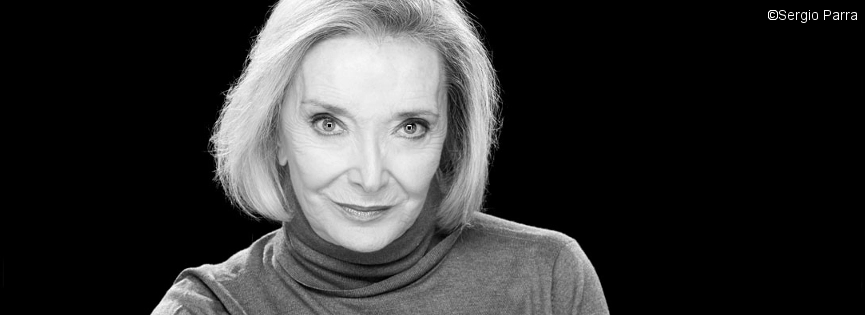Main content
Núria Espert 2016 Princess of Asturias Award for the Arts

Núria Espert (Hospitalet de Llobregat, 1935) joined the company of the Romea Theatre, Barcelona, at 12 years of age and debuted in a leading role at the Teatre Orfeó Graciense in 1952. She first came to the public’s attention in 1954 when starring in Medea, in her first national tour with the Teatro de Cámara Company, Barcelona. Together with her husband Armando Moreno, she founded the company that bears her name when she was 24. Since then, her career has taken her to stages all around the world, both as an actress and director, without neglecting her work in film and television.
In addition to her artistic and human sensitivity, Núria Espert has become one of the most outstanding and prolific personalities in the acting world, transcending all theatrical genres thanks to her own particular style and tradecraft as an actress and director. Moreover, her proficiency has made her a model for several generations of professionals, enjoying the respect and admiration of the entire profession. The first production her company staged was Gigi, by Sidonie Gabrielle (Colette), premiered at the Recoletos Theatre, Madrid, in 1959. This was followed by plays by Lope de Vega, Calderón de la Barca, Seneca, Euripides, Sartre, Guimerá, Casona, Bertolt Brecht and Shakespeare, among others. She was the first woman to play the role of Hamlet in Spain and she managed to make Sartre’s texts known outside of minor chamber theatre circles. The Maids, by Jean Genet, premiered in 1969 at the Barcelona Poliorama and the Belgrade Festival, where it won the Grand Prix, supposed the springboard for an unprecedented international tour for a Spanish company. In Spain, however, the censors banned the scheduled tour. The same occurred with the premiere of Yerma, by Federico Garcia Lorca, which was suspended several times until obtaining permission in 1971 for its staging at Madrid’s Teatro de la Comedia. This play became her most emblematic production, with which she toured the stages of London, Paris, New York, Philadelphia, Los Angeles, San Francisco, Buenos Aires, Rosario, Cordoba (Argentina), Caracas, Maracaibo, Rio de Janeiro, São Paulo, Mexico City, Belgrade, Venice, Jerusalem, Tel Aviv, Warsaw and Tokyo.
In 1979, she became head of the then newly created National Drama Centre (CDN) for two seasons, directing the programming of the Teatro María Guerrero, which exclusively comprised plays by Spanish authors (Cervantes, Benet i Jornet, Calderón de la Barca, Bergamin, Lorca and Nieva). In 1986, she began to work as stage director in theatre productions and operas such as Madama Butterfly, Electra, Rigoletto, La Traviata, Carmen and Turandot, which she staged at the Liceu, in Barcelona, Covent Garden and the Lyric Hammersmith, in London, Glasgow Royal Theatre, Los Angeles Opera and La Monnaine, in Brussels. In 1990, she resumed acting with the monologue Make-up, directed by Koichi Kimura, while her latest plays as an actress include The Little Foxes (2012) and King Lear (2015).
Holder a honorary degrees from the Menéndez Pelayo International University and Madrid’s Complutense University, Chevalier of the French Order of Arts and Letters and Commander of the Order of Merit of the Republic of Italy, she has received Spain’s National Acting Award (1960) and National Theatre Award (1984), the Los Angeles Critics Award (USA, 1972), the Laurence Olivier Award for Best New Play in London (1986), Sarajevo’s Freedom Award (1995), the Sigismund Award from the Association Stage Directors (1997), the Spanish Union of Actors Lifetime Award (2007), the Valle-Inclán Theatre Award (2010), the Corral de Comedias Award from the Almagro Festival (2011), the Ceres Emerita Augusta Award (2013 ) and Catalonia’s National Culture Award (2015), among others. Holder of the Gold Medal of Merit in Fine Arts, she has also been awarded the Medal of the Círculo de Bellas Artes, Madrid, the Band and Gold Star of the City of Belgrade, the Medal of Merit in the Theatre from the Barcelona Provincial Council and the St George’s Cross from the Generalitat of Catalonia.
End of main content
